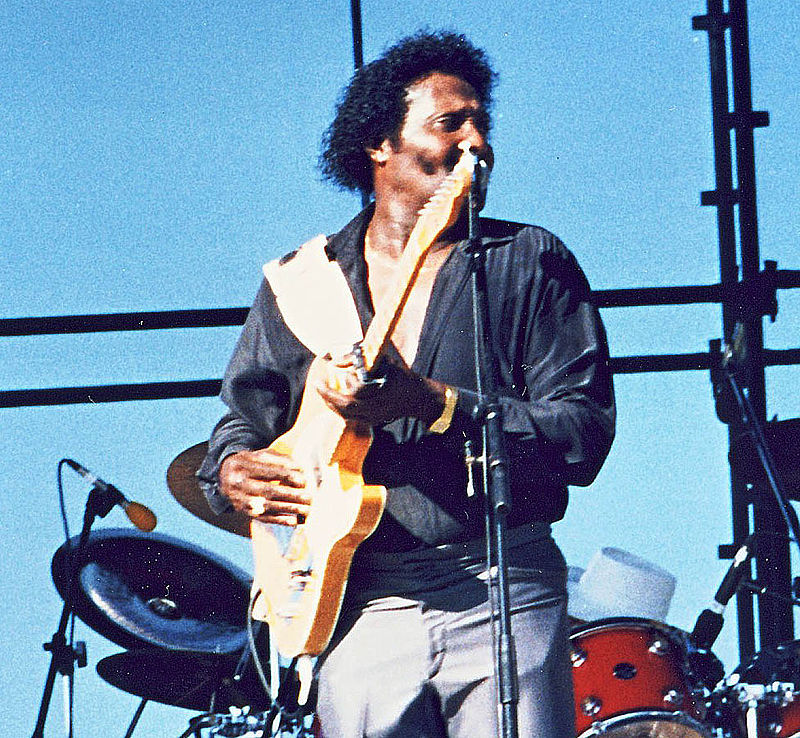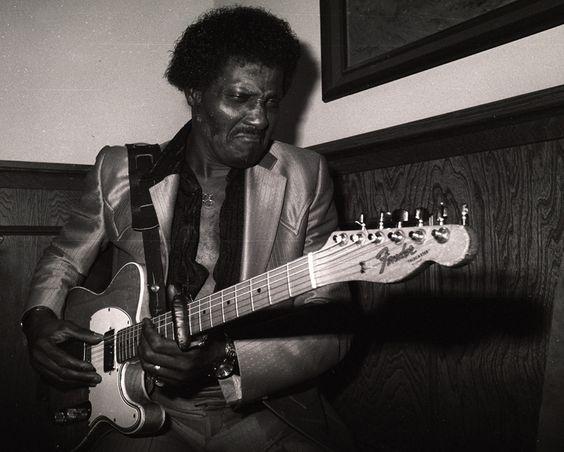Albert Collins: The Master of the Telecaster
Introduction
Albert Collins, affectionately dubbed “The Iceman,” was one of the most electrifying figures in the blues world. With his signature Fender Telecaster, unique tuning, and aggressive, stinging guitar tone, Collins carved out a distinct voice in electric blues that influenced generations of musicians. Known for his high-energy performances and inventive style, he bridged traditional blues with a modern flair, earning accolades and a Grammy Award along the way. His music became a staple in blues circles, and his legacy endures through the many artists he mentored and inspired.

Childhood
Albert Collins was born on October 1, 1932, in Leona, Texas, a small rural town in the eastern part of the state. He was one of eight children in a working-class family, and like many African Americans in the South during the early 20th century, he grew up surrounded by music and hardship. His parents, Joseph and Ardella Collins, were sharecroppers who emphasized church values and hard work.
At a young age, Collins was exposed to gospel and country music through the radio and community gatherings. However, it wasn’t until his family moved to Houston in the late 1930s that he encountered the raw, urban sound of the blues. The thriving music scene in the city introduced him to the work of artists like T-Bone Walker and Lightnin’ Hopkins, who would have a lasting influence on his musical development.
Youth
As a teenager in Houston’s Third Ward, Collins began to show a keen interest in the guitar. Though he initially considered learning the organ, he was drawn to the expressive power of the electric guitar. His cousin, blues guitarist Lightnin’ Hopkins, served as both a mentor and inspiration.
Collins taught himself to play, developing a distinctive style that included the use of a capo and open F minor tuning—a highly unorthodox approach that would later become his trademark. By the time he was in high school, he was performing in local clubs, absorbing the sounds of Texas blues and rhythm & blues.
His early bands, including The Rhythm Rockers, played a mix of blues and rock ‘n’ roll. Despite limited financial resources, Collins was determined to pursue music professionally. His commitment to originality set him apart from his peers early on.
Adulthood
Collins’s career gained serious traction in the late 1950s when he recorded a series of instrumental singles for the Kangaroo and Hall-Way labels. One of his earliest hits, “Frosty” (1962), showcased his icy tone and aggressive attack, cementing his nickname, “The Iceman.” “Frosty” sold over a million copies and became a blues classic.
Throughout the 1960s and ’70s, Collins toured extensively across Texas and beyond. His live performances were legendary: he often walked into the audience while soloing, sometimes leaving the stage entirely, trailing a long guitar cable behind him. His showmanship and technical skill earned him a devoted fan base.
In the late 1970s, Collins signed with Alligator Records, one of the premier blues labels in the United States. His albums for Alligator—such as Ice Pickin’ (1978), Frostbite (1980), and Don’t Lose Your Cool (1983)—earned him critical acclaim and a wider audience. He also became a regular on the international blues festival circuit.
Despite his growing fame, Collins remained approachable and humble. He was known for encouraging younger musicians, and he collaborated with several future stars, including Stevie Ray Vaughan and Robert Cray.
Major Compositions
Albert Collins’s discography may not be as vast as some of his contemporaries, but his music is packed with innovation and passion. His most celebrated works include:
- “Frosty” (1962): A blues instrumental that brought him national attention. Its icy riffs and rhythmic punch remain iconic.
- “I Ain’t Drunk” (1978): A humorous yet biting song that showcases Collins’s lyrical wit and fiery guitar work.
- “Master Charge” (1978): A song reflecting financial frustrations with a blues twist.
- “If You Love Me Like You Say” (1980): A slow-burning blues track with Collins’s characteristic sting and emotional depth.
- “Too Tired” (1983): A favorite of many blues guitarists, it blends traditional blues with modern phrasing.
In 1985, Collins participated in the Grammy-winning album Showdown! alongside Robert Cray and Johnny Copeland. The collaboration was a testament to his influence on the next generation of blues artists.
Death
In 1993, Collins was diagnosed with lung cancer, a devastating blow to both the artist and his fans. Despite his illness, he continued to perform for as long as he could, refusing to let his passion for music fade.
Albert Collins passed away on November 24, 1993, in Las Vegas, Nevada, at the age of 61. The blues community mourned the loss deeply. Tributes poured in from musicians and fans around the world, celebrating a man who had not only mastered his craft but had given so generously to others.
He is buried at Forest Lawn Memorial Park in Glendale, California.
Conclusion
Albert Collins left an indelible mark on the history of blues. His distinctive tone, fearless improvisation, and charismatic stage presence set a new standard for blues guitarists. Though his recording career began later than many of his peers, he made up for it with powerful, enduring contributions.
Nicknamed the “Master of the Telecaster,” Collins influenced countless musicians in blues, rock, and soul. His pioneering use of minor tunings and creative phrasing expanded the vocabulary of blues guitar. Today, his legacy lives on in the playing of artists like Joe Bonamassa, Derek Trucks, and Susan Tedeschi.
From Texas juke joints to international stages, Albert Collins brought fire and ice to the blues—and his music continues to inspire long after his final performance.

Comments are closed